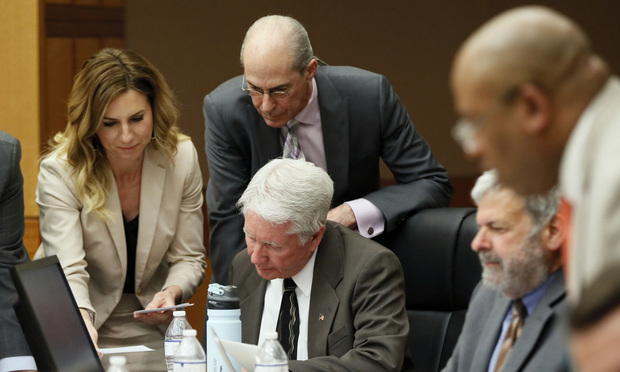McIver Defense Rests After Three Days of Testimony
Claud "Tex" McIver did not take the stand as the defense wrapped up Friday.
April 13, 2018 at 04:06 PM
4 minute read

Lawyers representing Atlanta attorney Claud “Tex” McIver rested their defense Friday after informing Fulton County Superior Court Judge Robert McBurney that he would not testify in his murder trial.
Prosecutors will offer rebuttal witnesses Monday.
The defense ended three days of testimony with their own crime scene expert, Ross Gardner, the former chief of the Lake City, Georgia, police department. Gardner testified the gun McIver's gun was likely resting flat on top of his right thigh when it fired.
He also said that, based on his analysis, it was “physically impossible” that the gun was pointed directly at the seat Diane McIver was in, given the spatial constraints of the back seat where McIver sat.
“I have confidence that the weapon was somewhere between the forward hip and the lower thigh at the time of discharge,” he said.
Gardner was the final witness presented by McIver's defense team.
Gardner was called to counter testimony by the prosecution's crime scene expert, Michael Knox, who testified that McIver's explanation of how he was holding the gun when it fired was inconsistent with the bullet's trajectory through the front passenger seat.
During his testimony Friday, Gardner said he “couldn't be confident” about how far back the gun may have been from the seat.
Gardner said that, while crime scene photographs taken within hours of the shooting depicted what he identified as gunshot residue surrounding the bullet hole in the seat, it was gone by the time he inspected the Ford Expedition.
Atlanta police returned the SUV to McIver days after the shooting. McIver took it to a handyman to have cleaned before selling it, but the Fulton County district attorney ordered it re-seized and shipped to the Georgia Bureau of Investigation for further tests.
Gardner also said, “We lost the best evidence we could have had” in determining the gun's location in the car when Atlanta police did not conduct gunshot residue tests on McIver's hands or preserve the pants he was wearing when the gun fired.
While McIver's attorneys defended the Atlanta police investigation, which concluded the shooting was likely an accident, Assistant District Attorney Clint Rucker repeatedly took the lead homicide detective to task for over failing to conduct interviews, forensic tests and financial reviews.
Gardner said he based his determination of how McIver was holding the gun on an armrest in the right rear of the SUV that he said would have limited his ability to hold the gun alongside his right thigh.
Defense attorney Bruce Harvey also elicited testimony from Gardner that there's no way to determine whether McIver intentionally fired the gun. Gardner explained that an unintentional discharge could be “an automatic response by an individual that causes the gun to go off… There is no conscious act on my part,” he explained. “My body does something, and I have no specific control over it.”
“It happens?” Harvey asked.
“Correct,” Gardner responded.
Rucker challenged some of Gardner's findings in an often combative cross-examination that prompted Harvey to say, “You can't cut him off if you don't like the damn answer.”
Rucker hammered Gardner for using a model semi-automatic Taurus as the basis for his reconstruction that's 3 inches longer than McIver's Smith & Wesson .38-caliber revolver.
Rucker did secure two significant admissions from Gardner. The crime scene reconstruction expert agreed that any statement that McIver's gun fired when the SUV hit a bump would be untrue.
Gardner also testified that McIver defense lawyer Stephen Maples' demonstration to Atlanta police that the gun was pointed down between his client's legs when it fired was inconsistent with the evidence.
This content has been archived. It is available through our partners, LexisNexis® and Bloomberg Law.
To view this content, please continue to their sites.
Not a Lexis Subscriber?
Subscribe Now
Not a Bloomberg Law Subscriber?
Subscribe Now
NOT FOR REPRINT
© 2025 ALM Global, LLC, All Rights Reserved. Request academic re-use from www.copyright.com. All other uses, submit a request to [email protected]. For more information visit Asset & Logo Licensing.
You Might Like
View All
12-Partner Team 'Surprises' Atlanta Firm’s Leaders With Exit to Launch New Reed Smith Office
4 minute read
After Breakaway From FisherBroyles, Pierson Ferdinand Bills $75M in First Year
5 minute read
On the Move: Freeman Mathis & Gary Adds Florida Partners, Employment Pro Joins Jackson Lewis
6 minute read
Veteran Litigators Move From Sidley Austin to Alston & Bird's New Chicago Office
3 minute readTrending Stories
- 1'A Death Sentence for TikTok'?: Litigators and Experts Weigh Impact of Potential Ban on Creators and Data Privacy
- 2Bribery Case Against Former Lt. Gov. Brian Benjamin Is Dropped
- 3‘Extremely Disturbing’: AI Firms Face Class Action by ‘Taskers’ Exposed to Traumatic Content
- 4State Appeals Court Revives BraunHagey Lawsuit Alleging $4.2M Unlawful Wire to China
- 5Invoking Trump, AG Bonta Reminds Lawyers of Duties to Noncitizens in Plea Dealing
Who Got The Work
J. Brugh Lower of Gibbons has entered an appearance for industrial equipment supplier Devco Corporation in a pending trademark infringement lawsuit. The suit, accusing the defendant of selling knock-off Graco products, was filed Dec. 18 in New Jersey District Court by Rivkin Radler on behalf of Graco Inc. and Graco Minnesota. The case, assigned to U.S. District Judge Zahid N. Quraishi, is 3:24-cv-11294, Graco Inc. et al v. Devco Corporation.
Who Got The Work
Rebecca Maller-Stein and Kent A. Yalowitz of Arnold & Porter Kaye Scholer have entered their appearances for Hanaco Venture Capital and its executives, Lior Prosor and David Frankel, in a pending securities lawsuit. The action, filed on Dec. 24 in New York Southern District Court by Zell, Aron & Co. on behalf of Goldeneye Advisors, accuses the defendants of negligently and fraudulently managing the plaintiff's $1 million investment. The case, assigned to U.S. District Judge Vernon S. Broderick, is 1:24-cv-09918, Goldeneye Advisors, LLC v. Hanaco Venture Capital, Ltd. et al.
Who Got The Work
Attorneys from A&O Shearman has stepped in as defense counsel for Toronto-Dominion Bank and other defendants in a pending securities class action. The suit, filed Dec. 11 in New York Southern District Court by Bleichmar Fonti & Auld, accuses the defendants of concealing the bank's 'pervasive' deficiencies in regards to its compliance with the Bank Secrecy Act and the quality of its anti-money laundering controls. The case, assigned to U.S. District Judge Arun Subramanian, is 1:24-cv-09445, Gonzalez v. The Toronto-Dominion Bank et al.
Who Got The Work
Crown Castle International, a Pennsylvania company providing shared communications infrastructure, has turned to Luke D. Wolf of Gordon Rees Scully Mansukhani to fend off a pending breach-of-contract lawsuit. The court action, filed Nov. 25 in Michigan Eastern District Court by Hooper Hathaway PC on behalf of The Town Residences LLC, accuses Crown Castle of failing to transfer approximately $30,000 in utility payments from T-Mobile in breach of a roof-top lease and assignment agreement. The case, assigned to U.S. District Judge Susan K. Declercq, is 2:24-cv-13131, The Town Residences LLC v. T-Mobile US, Inc. et al.
Who Got The Work
Wilfred P. Coronato and Daniel M. Schwartz of McCarter & English have stepped in as defense counsel to Electrolux Home Products Inc. in a pending product liability lawsuit. The court action, filed Nov. 26 in New York Eastern District Court by Poulos Lopiccolo PC and Nagel Rice LLP on behalf of David Stern, alleges that the defendant's refrigerators’ drawers and shelving repeatedly break and fall apart within months after purchase. The case, assigned to U.S. District Judge Joan M. Azrack, is 2:24-cv-08204, Stern v. Electrolux Home Products, Inc.
Featured Firms
Law Offices of Gary Martin Hays & Associates, P.C.
(470) 294-1674
Law Offices of Mark E. Salomone
(857) 444-6468
Smith & Hassler
(713) 739-1250






